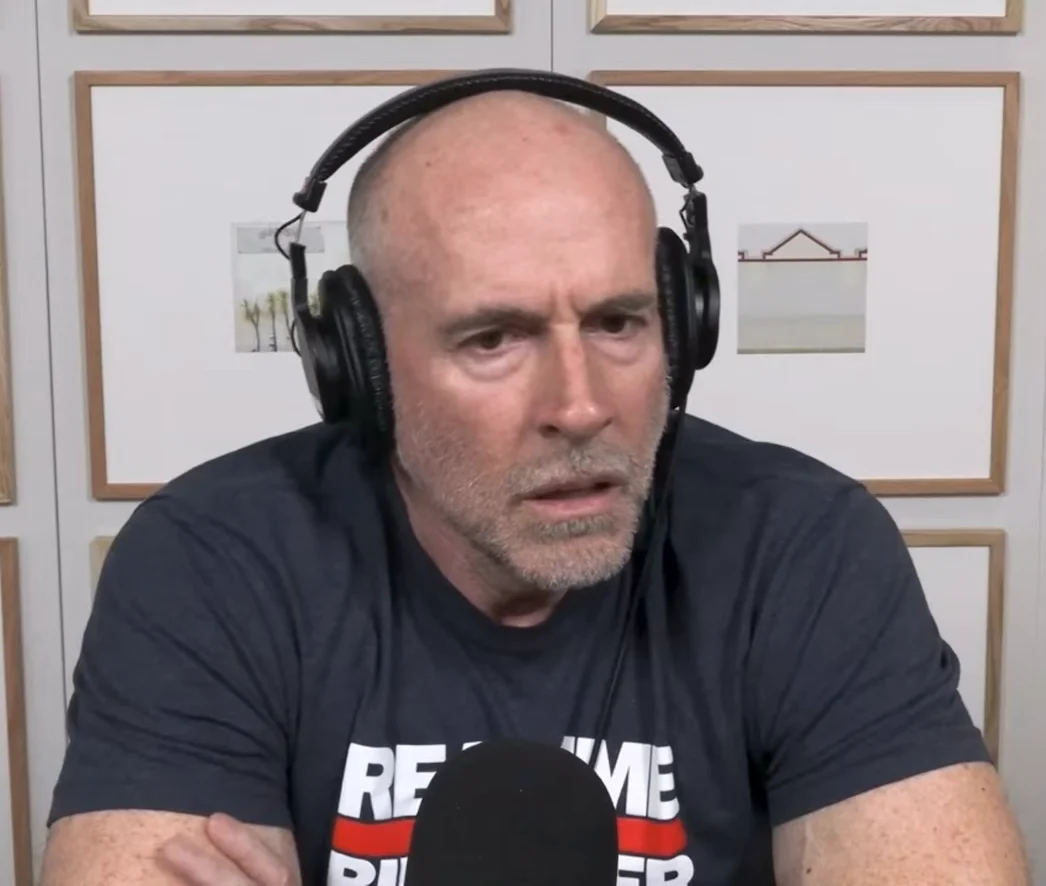You’ve known two-faced hypocrites in business. You’ve encountered self-destructive people and mean cusses who destroy other people psychologically and emotionally with their cruel and unempathetic feedback.
You’ve seen your share of pompous people who get angry when someone else shows up late for their meeting yet habitually saunter in late for meetings held by others. You’re worked alongside plenty of insecure people all over the business world.
You know about all these types of people. But you’ve rarely if ever come across in business a person who has all these bad qualities and will admit to you every one of them. Until now.
Scott Galloway, a marketing professor with the New York University Stern School of Business, is mean, frail, arrogant, opinionated, angry, hard-working, off-putting, charismatic, smart and 100 percent sure there is no god. Often perturbed, sometimes worthy of sympathy, occasionally pathetic, yet undeniably compelling, this unusual guy is making it big by saying controversial things and then admitting all his flaws – all as a differentiated promotional marketing strategy.
Be a jerk. Then cleverly admit you act like a jerk. That’ll make more people notice you, come to hear you talk, and sign up for your class. To hear more of your self-criticism and criticism of others and how wrong the world is and how successful you’ve been while also failing so many times.
This is a person to be admired for hard work, and articulate and powerful insights yet richly deserving of criticism and skepticism about his real agenda. He’s not someone you would want your children to emulate. Give him credit for this, though: he’s daring. He accuses universities of being greedy. He has the audacity to trash the higher education world that pays him and gives him the platform to be a big media star.
In a public appearance he shared the story about his sister asking him why, while so successful, he’s so angry. Moved by the comment, he decided to research and write a book about happiness with the intent of understanding happiness better. In that sense, he didn’t succeed.
The book is titled The Algebra of Happiness: Notes on the Pursuit of Success, Love, and Meaning. I read it while feeling uncomfortable about his charm, unnerving candor, and awareness that he would spew any opinion that came to his mind. The more I read, the more I realized he’s more of an anti-role model, self-promoter above all else.
He admits his many unattractive qualities, but I perceive that to be a market differentiation maneuver to get people to buy his books, attend his speeches, and tune into his podcasts. Say something you know people will disagree with. Get them emotionally charged up. And you’ve got them. A business strategy it is, but not one we should admire.
In the rest of this post, I’m going to share my thoughts on several sentences he wrote that reveal why we should be bewildered why he wrote a book about happiness filled with so much unhappiness.
Hypocrite
Galloway writes about how he expects students to be on time for his class, and when they’re late he tells them to leave and then writes condescending emails to them as a follow-up. He then admits to showing up late for meetings regularly himself.
“If it sounds like I am asking people to ‘do as I say, not as I do,’ then trust your instincts.”
There’s nothing admirable about being a hypocrite. You don’t become less hypocritical, or worthy of our understanding, just because you admit you are one.
Self Destructive
Business people are so focused on success and making money that it grabs our attention when someone admits to having self-destructive habits that hurt his business prospects. Although he claims to prepare well for speaking engagements – and that is evident — afterward he admits he just doesn’t do what would be a natural purpose of the talk: to further business relationships and grow his personal brand and business.
“After the meeting, I’ll get an email from the client about additional work, or some other opportunity, then not respond in a timely fashion and lose momentum. I don’t follow up with people when I should. In general, a lack of professionalism and bad manners has reduced the slope of my trajectory.”
This is the most surprising revelation in the book. He works hard to put on a good presentation and then allows opportunities to languish. Strange behavior but not surprising because Galloway is a rare personality type.
Brutal Honesty
Consistent with his business strategy of saying outlandish things to grab attention, Galloway writes about the rather counter-intuitive notion that the best businesses to invest in are dull.
“If the business sounds so boring I want to put a gun in my mouth, then I’ll invest. I recently spoke at the J.P. Morgan Alternative Investment Summit, where the bank hosts three hundred of the wealthiest families in the world. There are some who own media properties or a national airline, but most killed it in iron/ore smelting, insurance, or pesticides.”
He could have made his point without the “gun in mouth” reference, but he had to bring up suicide to make the reader feel he’s willing to say anything to grab your attention. There was no need for this reference. But this is what he does to stand out. He goes over the edge with his words so people like me will quote from his book.
Don’t you loathe those people in business who have no problem trashing another person for poor performance or just because they have the power to get away with it? Galloway has no qualms about doing this.
“I’ve been incredibly open with people who didn’t perform up to my expectations, the standards for the job, or cab fare. Direct, constructive feedback is valuable.”
He’s right that candid feedback is important. But here’s what’s so complicated and calculated. He writes with incredible openness about his own shortcomings, but I sense that’s all to get us to ask “hey have you heard about the NYU professor who admits he’s insecure and doesn’t do what he tells others to do?” This generates buzz about him. It’s all a game to build his personal brand, get more speaking opportunities, podcast listeners, and book sales.
Making People Feel Bad
When people such as Galloway become well-known and powerful, they can often take advantage of that by treating people any way they feel. They can disrespect others by not responding to their emails, for instance, knowing they’re famous and don’t have to worry about making enough money to live comfortably. Galloway writes about one such incident in which he had been receiving congratulatory emails as the recipient of the 2018 Media for Liberty Award.
“I had been gracious enough to ignore them for two months. I regularly say things and write emails that make people feel bad, and I know it. It’s just being an asshole.”
Not forgivable, Scott, even if you concede to treating people poorly. Not admirable to write emails that make people feel bad. Just wrong. You impress no one by doing this. You inflict pain on others. The world needs exactly no one doing this ever again.
Another example of Galloway’s pomposity: He writes about the NYU administration wanting him to teach more, change or status, or do something else he doesn’t want to.
“I threaten to go to Wharton and I mostly get what I want. If I sound like a diva and pain in the ass, trust your instincts.”
Divas threaten people because they have power. It’s ugly behavior. You’ve written a book, Scott Galloway, about how to be happy and yet write about manipulating your employer to satisfy your need for power and prestige. A colossal contradiction you are.
You admit to being a narcissist to the public. Admitting that doesn’t give you the license to continue being a narcissist just because you admit you are one.
Insecurity
In business personal insecurity runs amok. Galloway offers blunt insight about his feelings of inadequacy.
“Right out of college, I was deeply insecure (now I’m just insecure), and every time people went into a conference room I assumed they were talking about me. It wasn’t vision but insecurity that led me to entrepreneurship.”
You can add paranoia to his extensive list of complicated personality traits. In this case, he’s not unusual. But his insecurity about his own abilities is clearly a big reason he’s become a hypocrite who is self-destructive and means to other people. Related to this, he writes about the uneasiness he feels as he becomes more famous.
“Increased attention/recognition puts a guy on my shoulder whispering in my ear, ‘Who are you kidding? You’re a fraud.’ Whenever success comes my way, it was because I was ‘fooling them.’ I feel anxiety, always, that I’d be found out for what I really am: a son of a secretary, who did poorly in school, did not invest in relationships, was selfish, and isn’t that gifted. Someone whose only real talent was self-promotion and taking credit for other people’s work. A fraud.”
If he’s afraid he’s a fraud, it may be because he is one. His real talent is self-promotion – even going so far as writing a book about how mean and self-centered he is because it’s rare for business people to admit this because it may jeopardize future career opportunities. He’s gotten so well-known that he can admit he’s a fraud and people will still pay him to speak at their events because of all the startling and sharp opinions he shares — many targeting business leaders.
Atheist
Staying on brand, he plays the faith card in the book to make us all even more emotionally riled up.
“I don’t believe in an afterlife, but I plan to indulge in a lot of psilocybin (magic mushrooms) before I check out, as I’d like to have some of the bright-light visions people describe when they’re near death. I’m 100 percent sure there is no god.”
He didn’t have to write that he wants to take mushrooms before he dies, but he knows this is the juicy detail that will get people to write about his book, which will increase sales, fill his pockets, keep the speaking opportunities coming, and podcast listener numbers rising.
He writes he’s “100 percent” sure there is no god knowing he could never be 100 percent sure of this. He’s just lying to get people to notice him.
It’s all a strategic business con. This is not a book about how to become happier. This is a book about making Scott Galloway feel more relevant and secure about his future business prospects.
Author Profile

-
Sammy Sportface, a sports blogger, galvanizes, inspires, and amuses The Baby Boomer Brotherhood. And you can learn about his vision and join this group's Facebook page here:
Sammy Sportface Has a Vision -- Check It Out
Sammy Sportface -- The Baby Boomer Brotherhood Blog -- Facebook Page
Latest entries
 BonusApril 15, 2024Dancing in the Meadowlands – Then Darting Away
BonusApril 15, 2024Dancing in the Meadowlands – Then Darting Away BonusApril 13, 2024Back in Bernardsville: You Can Go Home Again
BonusApril 13, 2024Back in Bernardsville: You Can Go Home Again BonusApril 12, 2024Jersey – His Hometown From A Lifetime Ago
BonusApril 12, 2024Jersey – His Hometown From A Lifetime Ago BonusApril 10, 2024Sportface Whizzing Up Freeway to Gotham City
BonusApril 10, 2024Sportface Whizzing Up Freeway to Gotham City

